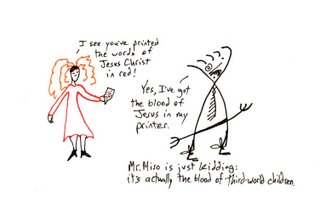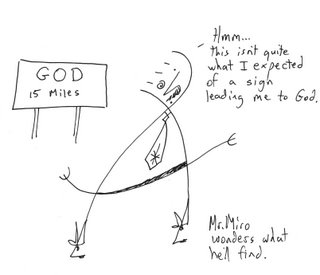"“
The love of one is barbaric: for it is pursued at the cost of all others. Likewise the love of God."” -Nietzsche


What are the most important parts of the Gospels? Everyone has their own sense of what is essential, and I find that my reading really focuses on the human condition. Jesus as the Christ is telling us (and demonstrating how) to
show mercy,
work for peace;
consider the lilies; heal the sick; eat with everyone;
feed my sheep,
tend my flock, and do so because of their need rather than their worthiness. These passages do not merely indicate that we are hungry, poor, and sick, although we certainly are; more importantly, we do not respond to the needs of others.






I recently stumbled back across the quote at the top of the page; this time, it made me think about the Great Commandment (
Matthew 22:37-39). I have heard people say how Jesus cheated here: when asked for a single most important commandment, he gave two; but what if he intended it to be two parts of the same commandment? That is, the best way to show our love of God with all your heart, all your soul, all your energy, all your mind is precisely to love your neighbor as yourself?
This Jesus is the compassionate teacher, but in that capacity he stands beside other figures both within and outside of the Christian tradition, most notably the Buddha. Because of this, I ask with Paul Tillich, "“In what sense and in what way is Jesus as the Christ the savior, or, more precisely, in what way does the unique event of Jesus as the Christ have universal significance for every human being and, indirectly, for the universe as well?"” (
Systematic Theology vol. II, 151) This involves a number of questions, including the meaning and method of “salvation;” Schillebeeckx points out, "“in which concrete historical events this '‘grace and favor'’ or renewed offer of salvation in Jesus has been manifested the New Testament nowhere explicitly states"” (
Jesus: An Experiment in Christology, 390). This comes as a bit of relief to me, since it often seems to me that people--e.g., Anselm in
Cur Deus Homo--are just making stuff up. Schillebeeckx doesn't come out and say this directly, but that seems to be his implication. That's not a bad thing, though: it gives me an opportunity--if not
imperative--to work this question out for myself.
The larger context for me is, what does it mean to be a universalist Christian, in the sense of acknowledging that there is truth to be found in the world'’s religious traditions, without either taking a condescending view of those other religions (viewing them as embodying Christian teachings in an adulterated form), or else losing the core of Christianity, so that it becomes one path among many with nothing in particular to recommend it. These seem to be the
Scylla and Charybdis between which I find myself navigating. In some respects the problem is precisely one of Christology: "“what is it that Christ has done for us that we could not do for ourselves?"” Even setting aside the absolute uniqueness of Jesus (so that others can play similar roles in different traditions), I still find myself stopping short with this question, even as I recognize its centrality. Looking again with Tillich, viewing salvation as healing of estrangement "“between God and man, man and his world, man and himself,"” (
Systematic Theology vol. II, 166) I still ask, what does Jesus as the Christ accomplish what we cannot do ourselves?

Even if the answer is that He has inaugerated the Kingdom of God, what exactly does that
mean?
 I don't really like the Doors.
I don't really like the Doors. 






















